
Capitol Records, LLC, and simply known as Capitol, is an American record label owned by Universal Music Group through its Capitol Music Group imprint. It was founded as the first West Coast-based record label of note in the United States in 1942 by Johnny Mercer, Buddy DeSylva, and Glenn E. Wallichs. Capitol was acquired by British music conglomerate EMI as its North American subsidiary in 1955. EMI was acquired by Universal Music Group in 2012, and was merged with the company a year later, making Capitol and the Capitol Music Group both distributed by UMG. The label's circular headquarters building is a recognized landmark of Hollywood, California.
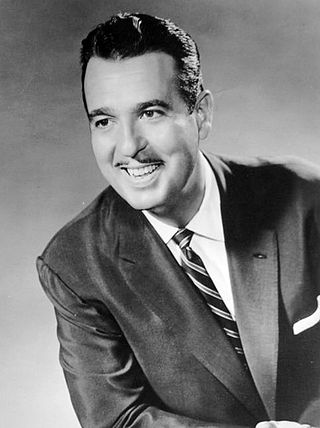
Ernest Jennings Ford, known professionally as Tennessee Ernie Ford, was an American singer and television host who enjoyed success in the country and western, pop, and gospel musical genres. Noted for his rich bass-baritone voice and down-home humor, he is remembered for his hit recordings of "The Shotgun Boogie" and "Sixteen Tons".

Robert Clark Seger is a retired American singer, songwriter, and musician. As a locally successful Detroit-area artist, he performed and recorded with the groups Bob Seger and the Last Heard and the Bob Seger System throughout the 1960s, breaking through with his first album, Ramblin' Gamblin' Man in 1969. By the early 1970s, he had dropped the 'System' from his recordings and continued to strive for broader success with various other bands. In 1973, he put together the Silver Bullet Band, with a group of Detroit-area musicians, with whom he became most successful on the national level with the album Live Bullet (1976), recorded live with the Silver Bullet Band in 1975 at Cobo Hall in Detroit, Michigan. In 1976, he achieved a national breakout with the studio album Night Moves. On his studio albums, he also worked extensively with the Alabama-based Muscle Shoals Rhythm Section, which appeared on several of Seger's best-selling singles and albums.

Leon Eric Brooks III, better known by his stage name Kix Brooks, is an American country music artist, actor, and film producer best known for being one half of the duo Brooks & Dunn and host of radio's American Country Countdown. Prior to the duo's foundation, he was a singer and songwriter, charting twice on Hot Country Songs and releasing an album for Capitol Records. Brooks and Ronnie Dunn comprised Brooks & Dunn for twenty years, then both members began solo careers. Brooks’ solo career after Brooks & Dunn includes the album New to This Town.
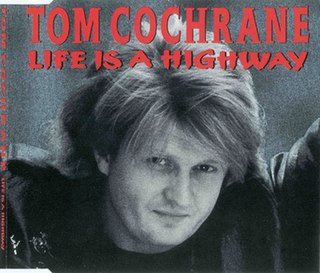
"Life Is a Highway" is a song by Canadian musician Tom Cochrane from his second studio album, Mad Mad World (1991). The song became a number-one hit in Canada in late 1991. "Life Is a Highway" also peaked at number six on the US Billboard Hot 100 chart in August 1992 and reached the top three in Australia and New Zealand the same year. The song was covered by Chris LeDoux for his 1998 album One Road Man and Rascal Flatts for the Cars soundtrack.

Please Hammer Don't Hurt 'Em is the third studio album by American rapper MC Hammer, released on February 12, 1990 by Capitol Records and EMI Records. Produced, recorded and mixed by Felton Pilate and James Earley, the album was made on a small budget of around $10,000 and recorded on a modified tour bus between May 1988 and November 1989.

Sawyer Brown is an American country music band. It was founded in 1981 in Apopka, Florida, by Mark Miller, Gregg "Hobie" Hubbard, Bobby Randall, Joe "Curly" Smyth (drums), and Jim Scholten. The five musicians were originally members of country singer Don King's road band, but chose to stay together after King retired in 1981. After competing on the television competition series Star Search and winning that show's grand prize, they signed to Capitol Records in 1984. The band recorded for Capitol between then and 1991, and for Curb Records between 1991 and 2005, except for a short time in 2003 when they were signed to Lyric Street Records. Duncan Cameron, formerly of the Amazing Rhythm Aces, replaced Randall in 1991, and Shayne Hill replaced him in 2004.
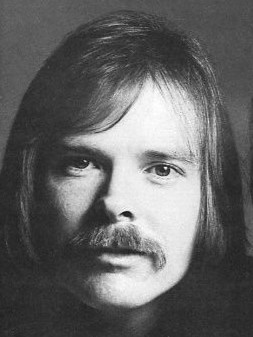
Danny Wayland Seals, also known as England Dan, was an American musician. The younger brother of Seals and Crofts member Jim Seals, he first gained fame as one half of the soft rock duo England Dan & John Ford Coley, who charted nine singles between 1976 and 1980, including the No. 2 Billboard Hot 100 hit "I'd Really Love to See You Tonight".

Anthony Graham Brown, known professionally as T. Graham Brown, is an American country music singer. Active since 1973, Brown has recorded a total of thirteen studio albums, and has charted more than twenty singles on the Billboard Hot Country Songs chart. Three of these singles — "Hell and High Water" and "Don't Go to Strangers" from 1986, and "Darlene" from 1988 — reached Number One, and eight more made Top Ten.

"The Thunder Rolls" is a song co-written and recorded by American country music artist Garth Brooks. It was released in April 1991 as the fourth and final single from his album No Fences. The song became his sixth number one on the country chart. Co-writer Pat Alger plays acoustic guitar on the track.
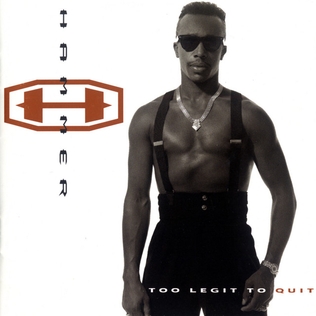
Too Legit to Quit is the fourth studio album by American rapper Hammer, released on October 29, 1991. Produced by Hammer and Felton Pilate, the album was released via Capitol Records and EMI Records. Considered the last album of a trilogy with Let's Get It Started (1988) and Please Hammer Don't Hurt 'Em (1990), it incorporates Hip Hop, pop rap and dance with elements of gospel and R&B with lyrical content ranging from positivity and love to social conscious.
"(I Love You) for Sentimental Reasons" is a popular song written by Ivory "Deek" Watson, founding member of the Ink Spots and of the Brown Dots, and William "Pat" Best, founding member of the Four Tunes.
"Sing a Sad Song" is a song written by Wynn Stewart. It was recorded notably by Merle Haggard in 1963, whose version became his first major hit. It was later recorded by Stewart himself. In 1976, Stewart's own version became a major hit as well.

The discography for American country music singer Merle Haggard includes 66 studio albums, five instrumental albums featuring his backing band the Strangers, as well as several live and compilation albums. Haggard recorded for a variety of major and independent record labels through the years, with significant years spent with Capitol Records, MCA Records, Epic Records and Curb Records, as well as his own label Hag Records.
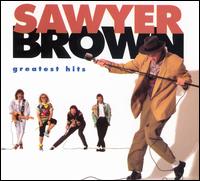
Greatest Hits is the first compilation album by American country music band Sawyer Brown. It was released in 1990 on Capitol Records, and it features nine singles from the band's first six albums, as well as the track "When Love Comes Callin'", which was released as a single. No songs from Somewhere in the Night or Wide Open are included, despite the former yielding a No. 2 hit.
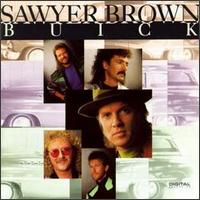
Buick is the seventh studio album by American country music band Sawyer Brown. Released in 1991 on Capitol Records, it features the singles "One Less Pony", "Mama's Little Baby Loves Me" and "The Walk". Although these first two singles reached the lower portions of the Billboard country music charts, "The Walk" peaked at #2, and was reprised on the band's 1992 album The Dirt Road.
Dennis Marty Brown is an American country music artist. Active between 1991 and 1996, he has released six studio albums and has charted one single on the Billboard Hot Country Songs charts. Marty Brown and his wife, Shellie, currently reside in Simpson County, Franklin, Kentucky, since July 2004.
Dana McVicker is an American country music artist. Born in Baltimore, Maryland, in 1963, she recorded for Capitol Records Nashville in 1988, releasing a self-titled album and charting four singles on the U.S. country charts. McVicker was also nominated for Best New Female Artist at the 1988 Academy of Country Music awards, losing to K. T. Oslin. She also appeared on the song "Young Country" from Hank Williams, Jr.'s Born to Boogie album.
Don Randi is an American keyboard player, bandleader, and songwriter who was a member of the Wrecking Crew.
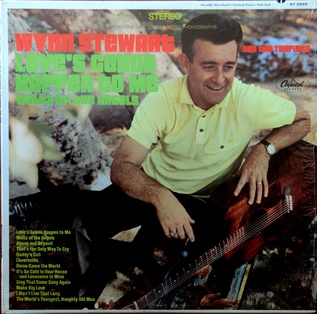
Love's Gonna Happen to Me is a studio album by American country artist Wynn Stewart. His backing band, "The Tourists," received equal billing on the album release. It was released in November 1967 via Capitol Records and was produced by Ken Nelson. It was Stewart's third studio album in his career and was the second album release of 1967. The album's title track became a major hit in 1967 during the same period of the record's release.















